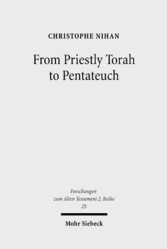Search and Find
Service
From Priestly Torah to Pentateuch - A Study in the Composition of the Book of Leviticus
More of the content

From Priestly Torah to Pentateuch - A Study in the Composition of the Book of Leviticus
Christophe Nihan investigates the composition history of Leviticus, considered as a separate 'book' in the Torah/Pentateuch. In order to account for the distinct nature of the text, the author combines redaction criticism with comparative observations, cross-cultural studies in rituals, and inner-biblical exegesis. His analysis focuses on the sources used by the authors of Leviticus and the way in which they are re-interpreted in what is primarily a literary composition; on the book's relationship to the so-called 'priestly' literature in the Pentateuch; and, finally, on the place of Leviticus in the composition of the Torah as a whole. In particular, it is argued that Leviticus 1-16 (except for chapter 10) was initially composed as the conclusion to the priestly narrative in Genesis and Exodus. It reinterprets earlier ritual texts serving as check-lists for priests, transforming them into a revelation made to Moses on Mt Sinai for the whole community and thereby achieving the sacerdotal ideal of Israel as the 'priestly nation' of the world. Thus, reinterpretation of earlier sources in Lev 1-16 goes hand in hand with a redefinition of the community's identity that betrays the specific concerns of the priestly scribes in Jerusalem under Persian rule, probably during the reign of Darius I. The introduction of Lev 17-26 (27), for its part, betrays an entirely distinct historical and literary context. Through the systematic reception of Deuteronomy on one hand and the 'Book of the Covenant' (Ex 21-23) on the other, an attempt is made to close the revelation on Mt Sinai with a legislation that bridges the gap between P and other biblical codes at the time of the Torah's composition.
Né en 1972; 2005 doctorat; depuis 2021 professeur ordinaire en Ancien Testament à l'Université de Münster, spécialisé dans la littérature et la religion de l'Israël ancien dans son contexte ouest-sémitique.
All prices incl. VAT










